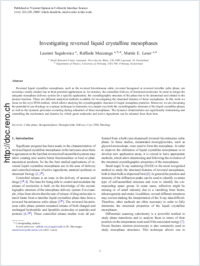Investigating reversed liquid crystalline mesophases
- Sagalowicz, Laurent Nestlé Research Center Lausanne, Vers-chez-les Blanc, Switzerland
- Mezzenga, Raffaele Nestlé Research Center Lausanne, Vers-chez-les Blanc, Switzerland - Department of Physics, University of Fribourg, Switzerland
- Leser, Martin E. Nestlé Research Center Lausanne, Vers-chez-les Blanc, Switzerland
-
07.09.2006
Published in:
- Current Opinion in Colloid & Interface Science. - 2006, vol. 11, no. 4, p. 224-229
English
Reversed liquid crystalline mesophases, such as the reversed bicontinuous cubic, reversed hexagonal or reversed micellar cubic phase, are nowadays widely studied due to their potential applications in, for instance, the controlled delivery of functional molecules. In order to design the adequate mesophase delivery system for a specific application, the crystallographic structure of the phase has to be determined and related to the desired function. There are different analytical methods available for investigating the structural features of these mesophases. In this work we focus on the cryo-TEM method, which allows studying the crystallographic structure of single mesophase particles. Moreover, we are discussing the potential to use rheology as a unique technique to determine in a simple way both the crystallographic structure of the liquid crystalline phases as well as the dynamic processes occurring during relaxation of these mesophases. The dynamic characteristics are significantly determining and controlling the mechanism and kinetics by which guest molecules and active ingredients can be released from their host.
- Faculty
- Faculté des sciences et de médecine
- Department
- Département de Physique
- Language
-
- English
- Classification
- Chemistry
- License
-
License undefined
- Identifiers
-
- RERO DOC 8272
- DOI 10.1016/j.cocis.2006.07.002
- Persistent URL
- https://folia.unifr.ch/unifr/documents/300452
Statistics
Document views: 140
File downloads:
- pdf: 451
